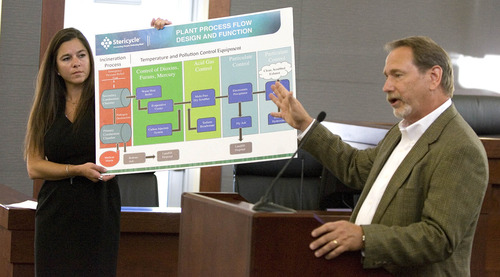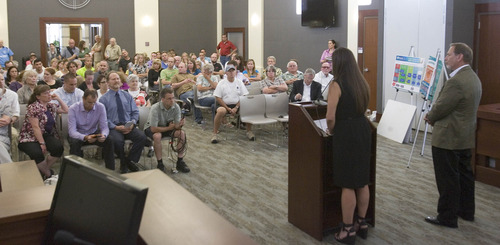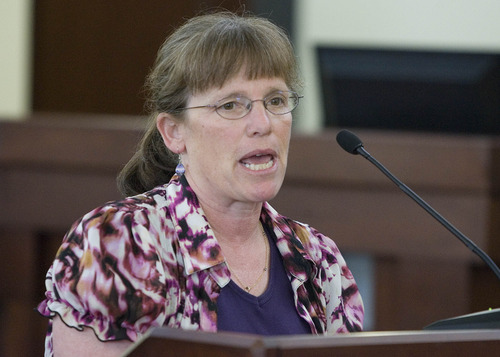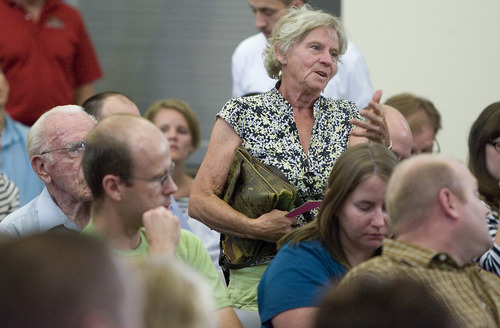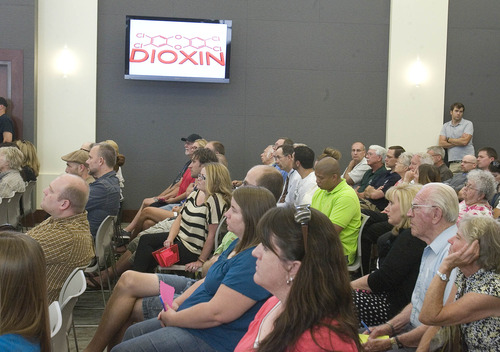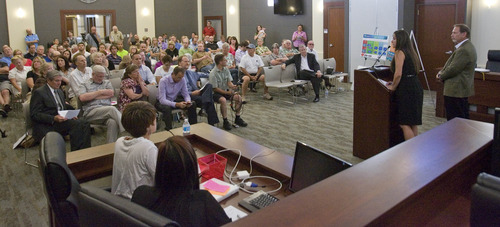This is an archived article that was published on sltrib.com in 2013, and information in the article may be outdated. It is provided only for personal research purposes and may not be reprinted.
North Salt Lake • Neighbors of the primary medical waste incinerator in the West demanded solutions Thursday from a company under state and federal scrutiny for excessive emissions.
Representatives of Stericycle Inc. flew in from Illinois to meet with the concerned residents at a town hall meeting. Originally, the residents just wanted to know what was behind the state's May 28 violation notice, but now many say it's time for the state to make their community safe and shut down the plant.
"How long will it take Stericycle to relocate somewhere else?" said Aaron Wiley, one of the 100 area residents who attended the meeting at North Salt Lake City Hall.
The Utah Division of Air Quality, which also attended Thursday's meeting, has accused the company of manipulating emissions tests and pumping excessive pollution into the air, including dioxins and furans, chemicals that disrupt hormones and that have been linked to cancer. State permits allow the incinerator to burn more than a ton an hour and treat about 7,000 tons of medical waste per year.
Stericycle informed state regulators two weeks ago that pollution-scrubbing equipment has been updated and the incinerator is in compliance now, and pledged to comply with regulations and stepped-up testing requirements.
Air-quality officials have granted Stericycle an extension — until the end of July — to decide if the company will try to fight the state's allegations before the officials assess penalties.
Selin Hoboy, Stericycle's vice president of legislative and regulatory affairs, described what happens at the North Salt Lake incinerator, located near the Legacy Parkway. It burns bloody bandages, used needles, chemotherapy waste and other medical discards.
"It is our intent to stay," she told the group, "and be a good neighbor in the community."
Meanwhile, Stericycle's Utah records also have been reviewed by federal investigators, state compliance regulators said earlier this month.
But the government's response has done little to quiet the residents, who worried aloud about the danger to their children, themselves and even their gardens. More than 400 people have signed a Facebook petition demanding answers.
Among the critics Thursday were members of Utah Physicians for a Healthy Environment.
Pediatrician Ellie Brownstein, a member of the doctors group, said monitoring and measuring toxic emissions from the incinerator is too uncertain and the risk of harm to children and other neighbors — from cancer, birth defects and autism — is too high.
"The permit violations of Stericycle are obvious reasons for concern," she said in prepared remarks. "But even if the operation of this facility was conducted with utmost integrity, it would still represent an unacceptable community health hazard."
Brian Moench, founder of the doctors group, wrapped up the meeting by calling the incinerator's emissions a poison.
"The health consequences of this incinerator make it unquestionably an overall economic liability to the community," said Moench. "It is long overdue that this facility be shut down."
Twitter: @judyfutah


